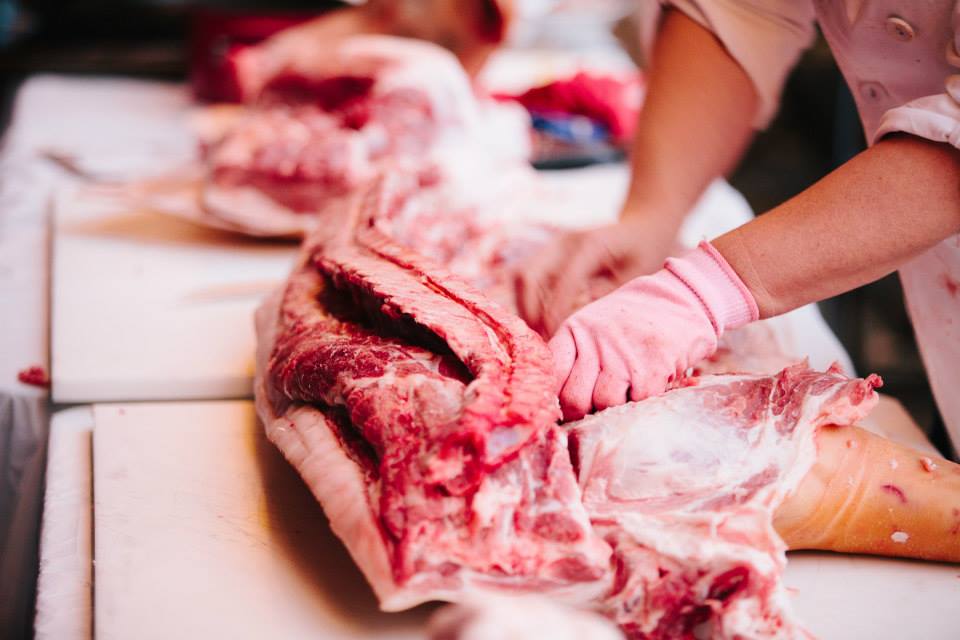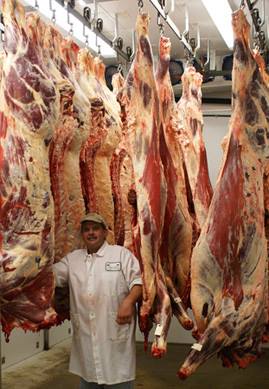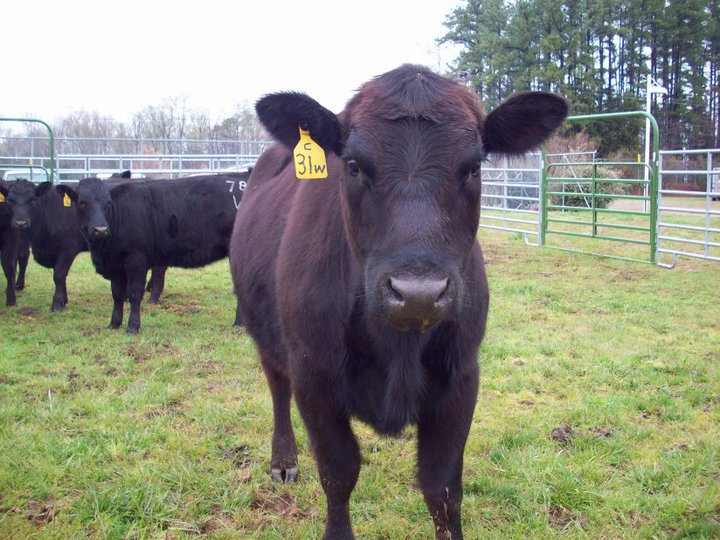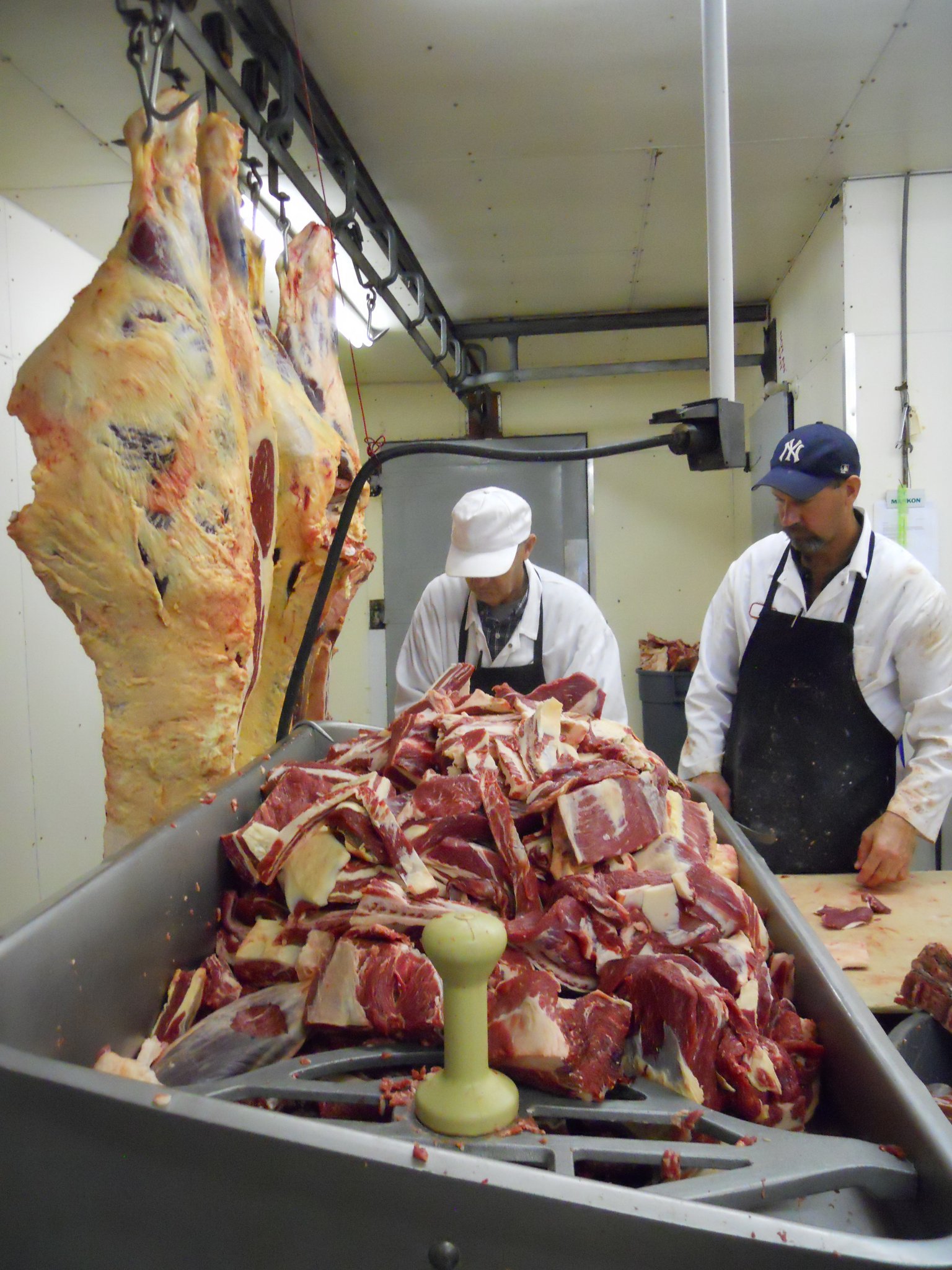By Jared Cates, CFSA Community Mobilizer, with thanks to NC Choices for providing some of the background information for this post.

Photo via NC Choices
Maybe you’ve noticed that it can be hard to find local, pasture-raised chicken at restaurants or grocery stores. Have you ever wondered why? One of the reasons is that meat processors who work with individual and small farmers are few and far between in the Carolinas. Increasingly, people want to know where their food comes from and so the lack of meat processing facilities that work with individual farmers is getting more attention.
Even members of Congress have noticed the lack of meat processing facilities. Representatives Thomas Massie (KY-R) and Chellie Pingree (ME-D) introduced The Processing Revival and Intrastate Meat Exemption (PRIME) Act (HR-3187) in July 2015. In March 2016, Senators Angus King (I-ME) and Rand Paul (R-KY) introduced the exact same bill in a Senate version (S.2651) of the same legislation.
If passed, the bill will allow states to set their own standards for processing meat sold within their borders. It would permit states to pass their own laws and regulations to allow custom-exempt processing facilities to slaughter and process meat for intrastate commercial sale.
The PRIME Act seeks to be a partial response to the loss of thousands of processing facilities across the country over the past 20 years. Consolidation within the meat industry has left many farmers who raise meat outside of the multi-national, vertically integrated corporate model with few if any options for processing their meat locally.
Currently, custom facilities across the country are exempt from state and federal inspection regulations to process meat for personal consumption. So, you can bring your own hog or cow to the nearest custom-exempt establishment, and bring the meat home for dinner. In NC, those facilities can process AND slaughter that meat for personal consumption, while in SC, slaughtered meat can be brought to those facilities for processing for personal consumption. However, when a farmer wants to actually sell meat to any buyer — individual consumer, restaurant, hotel, or grocery store — the animal must be slaughtered and processed at a USDA-inspected or NC or SC state-inspected facilities to legally sell the meat.

Photo via NC Choices
While every state has at least one USDA-inspected facility, only about half of states, including both SC and NC, offer state inspections. This means that both SC and NC are at an advantage compared to those states without state inspected facilities. But many state or federally inspected facilities only work with private companies, leaving individual farmers out in the cold. Those facilities that do service individual farmers frequently do not offer all the services that most farmers require (packaging, labeling, value-added, etc.) under one roof. As such, many small and mid-size farmers drive long distances, or in some cases, to more than one plant, to get the services they need to sell all of their meat products. Also, many facilities that do service individual farmers in the Carolinas are at maximum capacity, making it difficult to schedule with farmers and to bring on new clients.
So, what could the PRIME ACT mean for NC and SC? If passed, it would allow both states to then pass their own legislation that could open up custom-exempt facilities for commercial slaughter and/or processing. Currently, NC has 18 custom-exempt facilities and SC has 14; if both states opted to take action under the proposed PRIME Act, farmers could be able to have livestock slaughtered and processed at these facilities and be able to sell the meat within their respective state. Increasing the number of facilities available to farmers for commercial processing could mean shorter drives and lower transportation costs, which could translate to easier access to locally raised and processed meat.

Photo via NC Choices
The expansion of meat slaughter and processing into custom-exempt facilities could initially lower costs for some farmers selling wholesale who only need their meat halved or quartered. However, if a farmer wants specific cuts of meat packaged and labeled, the custom facilities will have to retool in a big way; an expense that could end up being paid by consumers. Also, it is possible that states passing any legislation opened up by the PRIME Act would also subject custom-exempt facilities to increased regulation because of this new expanded role in commercial meat distribution. This cost could be passed on to consumers and negate any potential savings for farmers or consumers.
The PRIME Act could be a step in the right direction for states without their own inspection programs, but it won’t do much to support the supply chain in the Carolinas. The legislation assumes that increasing the number of meat processing facilities is all it will take to sustain profitable local livestock and poultry industries. However, making local meat profitable is much more complicated than simply opening more processing facilities. Increasing the volume of meat being processed at already existing small state and federally inspected facilities could do far more for local meat than the PRIME Act.
One big challenge to increasing that volume is a lack of scale appropriate regulation. Small processing facilities have to adhere to the same food safety protocols, floor layouts, and regulatory procedures as giant facilities operated by large companies like Smithfield. Unlike private, vertically integrated companies, small independent processors don’t necessarily have templated regulatory plans and big money to build or add on to a facility. When small facilities run afoul of the regulations and are shut down until the problem is addressed, they can lose thousands of dollars that they can ill afford.
The meat processing industry is heavily regulated, making expanding services prohibitively expensive. On top of the regulatory challenges, small independent facilities that service independent farmers usually have 150 or so farmer clients whereas private companies often just service themselves. It is a different business model all together. By providing incentives for facility expansion, by creating better scale-appropriate policies, and by assisting owners of existing state- and federally-inspected to retool to provide more services under one roof, we can help meat processors in the Carolinas to stay profitable, lower costs to farmers, and make local meat more affordable for consumers.

Photo via NC Choices
Neither the Senate or House versions of PRIME Act have yet been heard in committee, which means they are not likely to pass during this congressional session. Representative Massie has said that if the bill does not pass this session he plans to introduce the measure as an amendment to the next farm bill.
While the PRIME Act wouldn’t fix the problems in the local meat supply chain, it has encouraged a national conversation about the state of the meat processing industry in the United States. Scale-appropriate regulation is badly needed to encourage expansion in the local meat markets. Calling national attention to this issue is making more people aware that our current policies and economies of scale present insurmountable challenges for small plants and the farmers and ranchers who use, or want to use, them.
Visit N.C. Dept. of Agriculture’s blog to read a recent post outlining the details of the duties performed by their Meat and Poultry Inspectors.
Meat Processing Establishment Definition
Custom Exempt – In NC, these facilities can slaughter and /or process Custom Exempt products: meat, poultry and wild game (deer and other animals hunted for food) for private individuals only. In SC, these facilities can only process, not slaughter, Custom Exempt products for private individuals only. All products are marked “NOT FOR SALE” and identified by the owner’s name. These facilities are inspected for sanitation and proper labeling of product. The meat and poultry products are not inspected for disease or quality and cannot enter commerce. All products must be returned to the original owner for his/her personal use and cannot be sold.
State Inspected – These facilities are regulated under the NC Meat and Poultry Inspection Division or the South Carolina Meat-Poultry Inspection Department and are inspected daily by a trained Meat & Poultry Inspector. Animals scheduled for slaughter and carcasses of slaughtered animals are inspected for disease and condemned by a veterinarian if necessary. Products from these establishments are labeled “Inspected and Passed by NCDA” or “SC – INSPD-PSD.” These products can be sold anywhere within the state that they are produced. These establishments may also slaughter (in NC) and / or process Custom Exempt product including wild game if kept separate from inspected products.
USDA/FSIS – These are federally inspected facilities and products may be sold in interstate and international commerce. Meat products produced in these facilities are labeled “Inspected and Passed by USDA.” Poultry Products produced in these establishments are labeled “Inspected for Wholesomeness by USDA.”
Talmadge-Aiken / Cross-Utilization – These facilities are USDA inspected plants that are staffed by inspectors who are state employees. They are inspected daily by a trained Meat & Poultry Inspector. Animals scheduled for slaughter and carcasses of slaughtered animals are checked for disease and condemned by a veterinarian if necessary. Meat products produced in these plants are “Inspected and Passed by USDA.” Poultry Products produced in these establishments are “Inspected for Wholesomeness by USDA.” They may be sold in interstate and international commerce. These establishments may also slaughter and / or process Custom Exempt product including wild game if kept separate from inspected products.


